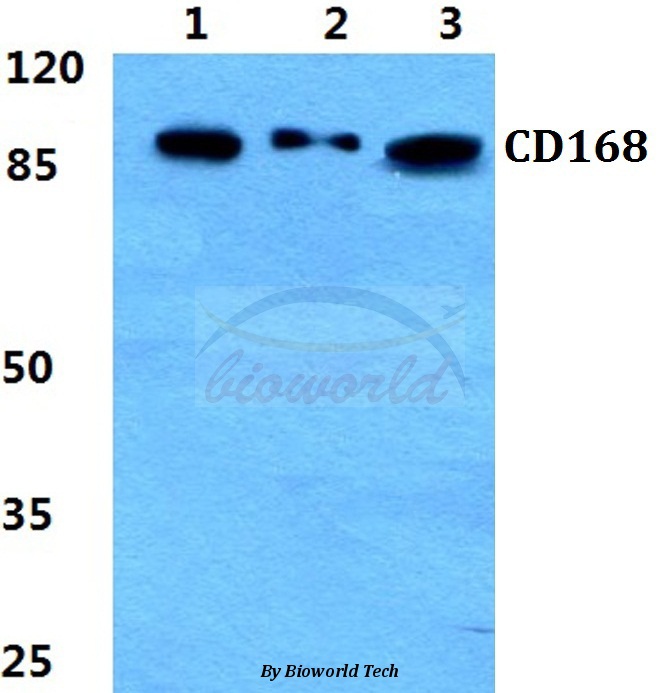Product Name :
CD168 polyclonal antibody Background :
Hyaluronic acid (HA) is a nonsulfated glycosaminoglycan that regulates cell adhesion and migration. HA effects are mediated through two receptors, CD44 (also designated HCAM) and the receptor of hyaluronic acid mediated motility (RHAMM). RHAMM, also designated intracellular hyaluronic acid binding protein (IHABP) and CD168, is a matrix receptor, which is linked to the plasma membrane by a GPI anchor and regulates cell motility. RHAMM expression is upregulated in malignant lymphoid tissues and is subsequently implicated in tumor progression and metastasis formation, as well as signal transduction. Although still unclear, RHAMM is thought to exist as several isoforms ranging in size. A variant isoform, designated v4, is a protein that when over-expressed, is thought to be the cause of transformation and metastasis formation in fibroblasts. Product :
Rabbit IgG, 1mg/ml in PBS with 0.02% sodium azide, 50% glycerol, pH7.2 Storage&Stability :
Store at 4°C short term. Aliquot and store at -20°C long term. Avoid freeze-thaw cycles. Specificity :
CD168 polyclonal antibody detects endogenous levels of CD168 protein. Immunogen :
Synthetic peptide, corresponding to amino acids 384-429 of Human CD168. Conjugate :
Unconjugated Modification :
Unmodification
CD168 polyclonal antibody Background :
Hyaluronic acid (HA) is a nonsulfated glycosaminoglycan that regulates cell adhesion and migration. HA effects are mediated through two receptors, CD44 (also designated HCAM) and the receptor of hyaluronic acid mediated motility (RHAMM). RHAMM, also designated intracellular hyaluronic acid binding protein (IHABP) and CD168, is a matrix receptor, which is linked to the plasma membrane by a GPI anchor and regulates cell motility. RHAMM expression is upregulated in malignant lymphoid tissues and is subsequently implicated in tumor progression and metastasis formation, as well as signal transduction. Although still unclear, RHAMM is thought to exist as several isoforms ranging in size. A variant isoform, designated v4, is a protein that when over-expressed, is thought to be the cause of transformation and metastasis formation in fibroblasts. Product :
Rabbit IgG, 1mg/ml in PBS with 0.02% sodium azide, 50% glycerol, pH7.2 Storage&Stability :
Store at 4°C short term. Aliquot and store at -20°C long term. Avoid freeze-thaw cycles. Specificity :
CD168 polyclonal antibody detects endogenous levels of CD168 protein. Immunogen :
Synthetic peptide, corresponding to amino acids 384-429 of Human CD168. Conjugate :
Unconjugated Modification :
Unmodification
-
 Western blot (WB) analysis of CD168 polyclonal antibody at 1:500 dilution Lane1:Hela cell lysate Lane2:NIH-3T3 cell lysate Lane3:H9C2 cell lysate
Western blot (WB) analysis of CD168 polyclonal antibody at 1:500 dilution Lane1:Hela cell lysate Lane2:NIH-3T3 cell lysate Lane3:H9C2 cell lysate
Bioworld Biotech only provide peptides for our antibodies and do not provide additional peptide customization services.
Price/Size :
USD 368/1mg/vial
Tips:
For phospho antibody, we provide phospho peptide(0.5mg) and non-phospho peptide(0.5mg).Describe :
Blocking peptides are peptides that bind specifically to the target antibody and block antibody binding. These peptide usually contains the epitope recognized by the antibody. Antibodies bound to the blocking peptide no longer bind to the epitope on the target protein. This mechanism is useful when non-specific binding is an issue, for example, in Western blotting (WB) and Immunohistochemistry (IHC). By comparing the staining from the blocked antibody versus the antibody alone, one can see which staining is specific; Specific binding will be absent from the western blot or IHC performed with the neutralized antibody.Formula:
Synthetic peptide was lyophilized with 100% acetonitrile and is supplied as a powder. Reconstitute with 0.1 ml DI water for a final concentration of 10 mg/ml.The purity is >90%,tested by HPLC and MS.
Storage:
The freeze-dried powder is more stable. For short time at 2-8°C. For long term storage store at -20°C.
Note :
This product is for research use only (RUO only). Not for use in diagnostic or therapeutic procedures.
 CD168 polyclonal antibody
CD168 polyclonal antibody  Datasheet
Datasheet COA
COA MSDS
MSDS SHIP
SHIP